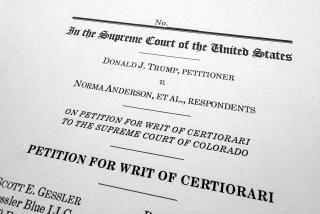The 5-4 court
WHEN THE Supreme Court in its 2005-06 term handed down unanimous decisions on two controversial subjects — abortion and campaign finance — it seemed possible that newly seated Chief Justice John G. Roberts Jr., an exponent of “judicial modesty,” would preside over a more collegial and consensus-seeking court.
The prospect of amity, which faded after Samuel A. Alito Jr. replaced the more moderate Sandra Day O’Connor in early 2006, has been definitively dispelled by the court’s 2006-07 term, which ended Friday. Although seven of the nine justices were appointed by Republican presidents, they found little to agree on. Instead, they resolved 24 cases by votes of 5 to 4 — up from 11 the prior term. So fractured were the votes that important issues debated by the justices emerged without any majority at all. The most closely watched ruling, on school integration, produced only a muddle of division and half-reasoning.
Not for nothing is a leading textbook about the court titled “Storm Center: The Supreme Court in American Politics.” This term, the winds too often blew in the wrong direction.
By a 5-4 vote, with Alito and Roberts in the majority, the court executed an ominous U-turn on abortion by upholding a federal ban on so-called partial-birth abortions even though it lacked an exception to protect a woman’s health. That same alignment — the four most conservative justices along with Justice Anthony M. Kennedy — worked its will to the nation’s detriment in other cases, striking down modest attempts to integrate public schools, weakening a landmark 1969 ruling protecting students’ free speech and taking a narrow view of a law allowing lawsuits alleging sex discrimination.
Other 5-4 decisions produced positive results. Joined by Kennedy, the four conservatives rightly corrected Congress’ overreaching in banning “electioneering communications” paid for by unions and corporations and broadcast close to an election. Though widely described as a conservative decision because of the voting alignment, that ruling is better viewed as a reaffirmation of free speech.
On other cases, the increasingly influential Kennedy sided with the court’s four liberals. Notably, that alignment ruled that the Environmental Protection Agency has the authority to regulate carbon dioxide — a decision that forced the Bush administration to reconsider its approach to global warming. Kennedy also joined the liberals in several cases in which prisoners were sentenced to death without adequate due process, including a 5-4 decision on Thursday that spared the life of a schizophrenic death row inmate in Texas who was under the delusion that he was facing execution because of his religious beliefs. So pivotal has Kennedy become that in the 24 cases this term in which he cast a vote in a 5-4 split, he voted with the prevailing side every time.
Even with Kennedy’s triangulation, the court is clearly more conservative than it was when O’Connor sat in the seat now occupied by Alito. Does that justify “I told you so’s” from liberals who accused President Bush of “packing the court” with clones of arch-conservative justices Antonin Scalia and Clarence Thomas? Not really. In choosing Roberts and Alito — two judges whose names appeared on lists of potential Bush appointees as early as 2000 — Bush was no more packing the court than was President Clinton when he appointed the more liberal Ruth Bader Ginsburg and Stephen G. Breyer.
Moreover, the 2006-07 term was notable for the newest justices’ refusal in some key cases to echo Scalia and Thomas. In the abortion case, for example, Roberts and Alito conspicuously declined to sign a Scalia-Thomas opinion suggesting that Roe v. Wade was wrongly decided and should be overturned.
That is small comfort against rulings that defy history and common sense in areas as vital as race relations and free speech. But with the 2008 presidential campaign looming, voters who prefer a different sort of justice should remember a comment Sen. Lindsey Graham (R-S.C.) directed to Democratic senators unhappy that Bush had chosen a conservative such as Alito: “Elections matter.”
More to Read
A cure for the common opinion
Get thought-provoking perspectives with our weekly newsletter.
You may occasionally receive promotional content from the Los Angeles Times.





